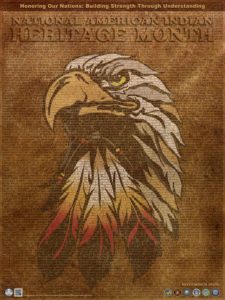
A U.S. Army Maj. in 1912 said “The real secret which makes the Indian such an outstanding soldier is his enthusiasm for the fight.”
For more than 200 years, American Indians and Alaskan Natives have served in times of peace and war. For those contributions and more, November is designated National American Indian Heritage Month. Team Ramstein, along with DOD personnel around the world, are taking time to reflect on the rich and diverse cultures, traditions and histories of American Indians.
The theme for this year’s observance is, “Honoring Our Nations: Building Strength Through Understanding.” The observance of National American Indian Heritage Month recognizes American Indians for their respect for natural resources and the earth, their service in the nation’s conflicts, and for their contributions to the United States.
“The Native American Indians embody a culture and a warrior tradition that is exemplified by strength, honor, pride, devotion, and wisdom,” said U.S. Air Force Maj. Maria-Rocio Vazquez, Ramstein Special Observance Council President and 86th Aeromedical Evacuation Squadron flight nurse instructor. “Their culturally determined role to be a warrior corresponds with the requirements to be a successful Airman in combat. Like many others, American Indians have fought courageously in all of this century’s wars and armed conflicts. The fighting spirit engrained in their physical, mental and spiritual character will continue to be a vital contribution to the future of warfare.”
Native Americans have historically had the highest record of service per capita when compared to other ethnic groups, with nearly 50 percent serving in the U.S. Navy.

During World War I and again in World War II, the U.S. military employed a number of American Indian servicemen to use their tribal languages as a military code that could not be broken by the enemy. These “code talkers” came from many different tribes, including Chippewa, Choctaw, Creek, Crow, Comanche, Hopi, Navajo, Seminole and Sioux. During World War II, the Navajo Code Talkers, the largest component of the code talkers, were pivotal in saving lives and ending the war in the Pacific theater.
Another of America’s Native American heroes from the past is U.S. Army Cpl. Mitchell Red Cloud Jr. of the Winnebago tribe. He was posthumously awarded the Medal of Honor for his valor in a fight-to-the-death during the Korean War.
Red Cloud’s Medal of Honor citation reads, his “heroic act stopped the enemy from overrunning his company’s position and gained time for the reorganization and evacuation of the wounded.”
Camp Red Cloud, South Korea, is named in Red Cloud’s honor, and is headquarters for the 2nd Infantry Division.
A modern-day Native American service member is Ramstein’s own U.S. Air Force Senior Airman Kaylea Berry, 86th Airlift Wing Public Affairs broadcast journalist. Berry is enrolled in the Mvskoko (Creek) Nation tribe, and is part of the Wotko (Raccoon) Clan.
“I am proud to be part of my tribe because we are proud people who highly value family and hard work,” Berry said. “We are proud of our heritage and where we come from. We do our best to keep our culture and language alive through events in the community, and teaching the new generations.”
Berry’s family has a tradition of serving in the military. She has three great uncles—Barton, Billy, and Bobby Williams — who all served in the Army, as well as past and present cousins who are veterans.
“I am proud to serve my country because it’s not only my home but the land of my ancestors,” Berry said. “Not everyone is able to serve in the military, and for me to be able to is such an amazing experience. To be able to travel the world, meet new people, and see how countries differ from the U.S. is an opportunity I never would have without being in the military.”
American Indians and Alaskan Natives continue to contribute to the legacy of this nation and shape its future.
For more information on National American Indian Heritage Month and other special observances, visit the Defense Equal Opportunity Management Institute special observances page at https://www.deomi.org/human-relations/special-observances.cfm.


